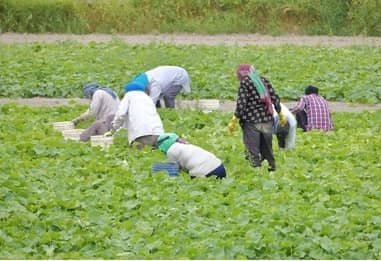
Agricultural Labor Definition
Labor is an indispensable factor of agricultural production. No farm operation can imagine without labor.
An agricultural laborer is basically unskilled and unorganized and has little for its livelihood other than personal labor. Agricultural workers maintain the quality of farms, crops, and livestock by operating machinery and physical labor tinder the supervision of farmers, ranchers, and other agricultural managers.
An agricultural worker is someone who works on a farm, maintaining crops such as fruits, vegetables, grains, and nuts. Some agricultural workers only tend to livestock. They typically work under the supervision of an agricultural manager, where they receive on-the-job training.
Any person employed to a farm in connection with cultivating the soil or in connection with raising or harvesting any agricultural or horticultural commodity, including the raising, shearing, feeding, caring for, training, and managing livestock, bees, poultry, and fur-bearing animals and wildlife.
Agricultural labor is defined as any person who is employed not only in crop production but also in hider employment in other agricultural occupations such as dairy farming, horticulture, livestock farming, apiculture, etc.
Classification of Agricultural Labor
Based on sources of labor:
- Family labor: Family labor includes the labor family members of the farmer. No payment as the wage is given for family labor.
- Hired labor: Hired laborers include the laborers performed by other than family members whose payments are given as payment. Hired labor is two types; a) Annual labor: Labors are employed in a farm family for a year with a fixed salary. b) Seasonal labor: A seasonal worker is an employee who performs labor or services on a seasonal basis. Wages may be varied from season or season to season.
Based on productivity labor:
- Productive labor: The labor which is used towards economic activity or creation of utilities is called productive labor.
- Unproductive labor: The labor which is used for non-economic activities is called unproductive labor.
Based on skill of labor:
- Skilled labor: A skilled worker is any worker who has special skill, training, knowledge, and (usually acquired) ability in their work. A skilled worker may have attended a college, university, or technical school. Or, a skilled worker may have learned their skills on the job.
- Unskilled labor: Unskilled labor is a segment of the workforce associated with a limited skill set or minimal economic value for the work performed. Unskilled labor is generally characterized by lower educational attainment, such as a high school diploma, GED, or lack thereof, and typically results in smaller wages.
Difference between skilled and unskilled labor:
Skill is a measure of the amount of worker’s expertise, specialization, wages, and supervisory capacity. Skilled workers are generally mote-trained, higher-paid, and have more responsibilities. Unskilled workers are generally no or less trained, low paid, and have less responsibility for their works.
What is Labor Productivity?
Labor productivity is a measure of economic growth within a country. Labor productivity measures the number of goods and services produced by one hour of labor; specifically, labor productivity measures the amount of real gross domestic product produced by an hour of labor.
